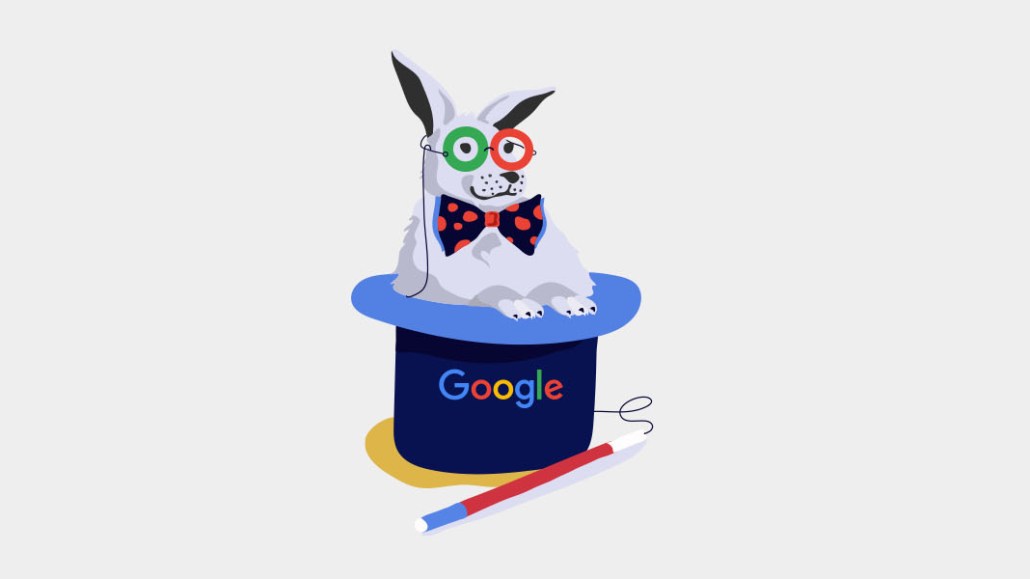Secure your place at the Digiday Media Buying Summit in Nashville, March 2-4
Google tests generative AI in Search Lab experiments that are key to defending its digital crown

The fruition of Microsoft’s multibillion-dollar investment in OpenAI has helped spur what some are labeling as the latest digital revolution, as terms such as “generative AI” become household phrases and ChatGPT achieves record levels of uptake.
Similar to the proliferation of the world wide web in the 1990s, and the mass uptake of smartphones and social media in the late 2000s and early 2010s, OpenAI’s success has placed generative artificial intelligence technologies firmly on the marketing industry’s agenda.
The adoption of ChatGPT — estimated to have hit 100 million users in January this year — has also seemingly given Microsoft control of the industry narrative, and earlier this week it debuted a chat API offering an ad monetization tool for third-party publishers.
Bing’s chat API preempted a period of launches and pitches by industry incumbent Google, which will follow up this week’s developer conference Google I/O with its YouTube upfront (dubbed Brandcast) and Google Marketing Live in the coming weeks.
It was at Google I/O where the online behemoth showcased its Search Labs experimentations, culminating in its Search Generative Experience, or “SGE,” which seeks to emulate the recent success of the Microsoft camp by similarly using a chat interface.
In short, SGE will enable Google users to quickly get the lay of the land on a topic by asking follow-up questions via AI-powered search returns. And, most importantly for marketers, SGE will also feature promotional space with dedicated ad slots available throughout the page, which are still being tested, that will be denoted from organic search returns via a “sponsored” label.
Vidhya Srinivasan, vp and general manager of Google Ads, told Digiday the current SGE project is part of “an experimental framework” geared toward observing what native ad formats drive performance for advertisers.
“The one thing we are trying out a little bit more differently [to Google’s historic means of testing new ad formats] is to be more open to trying out different combinations and permutations,” she said. “Users are also learning how to use this, and we just want to stay in lockstep as search itself gets super-charged with generative AI.”
In a note to investors, New Street Research partner Daniel Salmon interpreted Google’s approach as “playing both offense and defense,” adding that while much has been made of Microsoft threatening the hegemony of the search market, Google also appears to be on the offensive. In fact, he observed how the May 10 pitch at Google I/O seemed to fare better than its presentation of Bard earlier in the year — one that went awry and negatively impacted its share price.
However, multiple sources noted how the latest hype cycle is not the first attempt to highlight the potential application of AI in marketing and advertising circles, with previous attempts from the likes of Rocket Fuel and Sizmek falling short of promise.
Jeremy Fain, CEO of Cognitiv, told Digiday that companies like his (an ad tech startup that uses deep learning to help advertisers better hone their ad campaigns) have purposely avoided using terms such as “AI” in their marketing in a bid to avoid comparisons with such failed ventures.
“The industry has basically been skeptical of anybody saying that they use AI or machine learning,” he said, adding how growth in awareness since the beginning of the year has gone some way to reversing such cynicism.
Fain further went on to note how the current state of generative AI, and chatbots in particular, are “not fit for ads,” but that Google’s current experimentation will need to demonstrate to advertisers how such technologies can help them find new audiences in order for the company to maintain its dominance of the online advertising sector.
And while much public speculation seems to center upon the prospect of the likes of ChatGPT leading to challengers unseating Google’s control of the online advertising market, many are equally bullish on Google’s ability to move with the times.
Ari Paparo, CEO of Marketecture, made note that Google has a defendable moat in search, as chatbot features don’t outperform the current search engine experience in all verticals. Although, it could prove difficult for Google to maintain the lucrative margins it has historically enjoyed in its search advertising function.
“It seems pretty unlikely that they’ll be able to monetize [in a chatbot] as well as they currently have,” Paparo noted. “The actual cost of delivering one of these search results is much, much higher than it currently does.”
More in Marketing

Thrive Market’s Amina Pasha believes brands that focus on trust will win in an AI-first world
Amina Pasha, CMO at Thrive Market, believes building trust can help brands differentiate themselves.

Despite flight to fame, celeb talent isn’t as sure a bet as CMOs think
Brands are leaning more heavily on celebrity talent in advertising. Marketers see guaranteed wins in working with big names, but there are hidden risks.

With AI backlash building, marketers reconsider their approach
With AI hype giving way to skepticism, advertisers are reassessing how the technology fits into their workflows and brand positioning.








